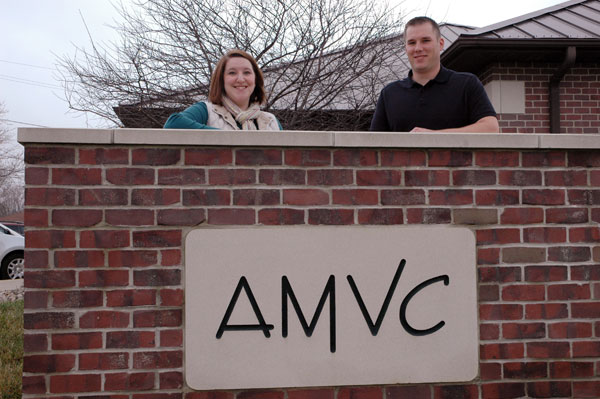“I just remember running the data on turnover rates for the first time since I started working here in Audubon, IA, and I was very surprised at the level they were at. Since then, those rates have dramatically gone down to about 40% in two years. My goal is to get it down to 25%,” explains Randeris, a member of the Audubon-Manning Veterinary Clinic’s (AMVC) five-person human resources team

About four years ago, Ann Randeris at AMVC Management Services, made a startling discovery — annual employee turnover rates were well over 75%.
“I just remember running the data on turnover rates for the first time since I started working here in Audubon, IA, and I was very surprised at the level they were at. Since then, those rates have dramatically gone down to about 40% in two years. My goal is to get it down to 25%,” explains Randeris, a member of the Audubon-Manning Veterinary Clinic’s (AMVC) five-person human resources team.
Targeted Scholarships
The human resources team goes to great lengths to find, develop, train and retain production workers who manage 90,000 sows for shareholders in six states — Colorado, Indiana, Iowa, Kansas, North Dakota and Ohio. Owners rely on AMVC to coordinate, supervise and oversee all facets of production, including employee management, and contracting with barn owners in those states to raise the pigs.
Randeris’ main responsibility is to coordinate the 362 full-time and part-time employees who work on the 25 sow farms. She has full accountability or shared responsibility for legal, payroll, scholarships, internships, recruiting and the new hire training and orientation process.
“The scholarship program is for individuals who are graduating from high school and are looking to attend secondary education,” she explains. “We actually work alongside the shareholders, who own the sows and sometimes own the hog facilities, in providing a $250 scholarship for every year a person works for AMVC while in high school.” Half is paid by AMVC and half is paid by the shareholder for the farm where a person worked. Students could earn up to $1,000 total scholarship.
According to Jason Hocker, DVM, a managing partner for AMVC Management Services, the purpose is to encourage students to pursue higher education and to give them exposure to hog production and agriculture.
It’s important to attempt to influence this group of young adults “because we are seeing more and more of the younger generation who aren’t as interested in agriculture, or they aren’t getting as much exposure that will encourage them to want to work in agriculture,” Randeris says.
The scholarship program started with the 2004 high school graduating class in the six states with AMVC-managed sow farms. More than 80 scholarships ($45,000) have been awarded to date, she points out.
Audubon, IA, the county seat and home of AMVC, is a case in point, Hocker says. Even with 2,500 residents, the largest in the county, Audubon County’s population has dwindled to just 6,200 people. Like many rural communities, Audubon has an aging population as young folk flee to the bigger city for jobs.
Internship Programs
One effort to reverse this trend is the AMVC Summer Intern Program, which is geared to providing students interested in the field of swine production or swine health with experience and knowledge in the management and operation of a swine production company, Randeris says.
Summer interns are expected to participate in a variety of AMVC activities, including management, production and industry events covering most aspects of swine production.
The 10-week program is a joint activity between AMVC and the Swine Production Immersive Knowledge Experience (SPIKE) program with the College of Veterinary Medicine at Iowa State University. It is geared for individuals who want to become a swine veterinarian.
AMVC also offers a 10- to 14-week production internship program to stimulate students’ interest in a job in the pork industry.
Typically, summer interns spend time at the boar stud, sow farm and nursery/finisher, and take field trips to a packing plant, feedmill and truck wash. The intern is also given a pass to attend World Pork Expo in Des Moines.
“Part of what we are trying to do with the intern program is to show them that they can have fun in a small community, which they are probably not thinking about at the time. But when they get to the point where they are going to raise a family, then the question becomes, where do you want to live and what is that going to cost you?” Hocker says.
Audubon is a very rural setting. “But it is not like we are living on an island,” Hocker emphasizes. “We are an hour from Des Moines and Omaha; Carroll is just 30 minutes north.” Randeris adds, “We want them fully immersed in the community so they see value, not only in AMVC, but the neighbors we are proud to be partnered with.”
The AMVC internship programs also provide time for group recreational activities, such as softball games, pool parties, and sleepovers in the training room at the AMVC Management Services facility. The goal is to make their summer experience an enjoyable one, show them there are things to do in a small town, and demonstrate that AMVC is a very family-oriented company, Randeris says.
Recruitment
AMVC does not require employees to have previous experience with swine, but Randeris acknowledges that the company does look for potential employees who have an agricultural background. “This is physical labor, and the work ethic comes from having done this type of work growing up,” Hocker adds.
Potential employees are identified and pursued using word-of-mouth referrals from local farmers and others, advertising in small town newspapers and other publications, and participation in many ag-related college job fairs in states where AMVC has production sites, according to Randeris.
Online recruiting is another avenue that is explored to attract younger employees, she adds.
Employee Training
New employees undergo rigorous training and education. They are taught that every job from the power washer on up is vital to the ultimate goal of food production, Randeris says. New hires receive training at the training facility in Audubon or via teleconference. A few years ago, AMVC hired an individual to focus on “hard skills” follow-up training to ensure employees were capable of handling their assigned production tasks.
New hires learn the origins of AMVC, its history and future plans, “to give them a comforting feeling in knowing that they made the right decision and chose the right organization to work for,” she comments. The day-long training session covers production and business skills, as well as social skills. “We talk about employee policy in our handbook, personal behavior, proper animal handling and safety training; there is a whole session devoted to biosecurity,” Randeris says.
Prior to entering a hog barn, new employees must also take Pork Quality Assurance and Transport Quality Assurance training. “That way, even before they ever work with an animal, they’ve got some basic knowledge of how to move animals and what the flight zone is,” Hocker says.
The final step for applicants includes a walk-through interview at the farm to meet the staff and gauge interest, a check of additional references and a job offer, which is contingent upon a background check and drug screening, Randeris says. There is a 60-day probation period for new hires.
The move to the group training facility at AMVC vs. previous individual training at the farm level has made a dramatic difference in attracting and keeping good employees, Hocker explains. On-farm training created a “disconnect” where disruptions made it difficult to evaluate and train, and slowed down completion of paperwork.
Keeping Good Employees
AMVC plans to continue a career development program to help retain employees. The program has three phases: experience and cross-training in an AMVC sow farm, training and classroom work, and a special project assignment.
On-farm experience covers basic production and management philosophies within the AMVC system.
Training and class work includes leadership development, management responsibilities, employee relations and human resources, financial basics, production reports and personal development.
The special project involves working with a mentor to develop a program to help advance a production system and employee interests, as well as to teach self-motivation, leadership and workflow management.
The career development program has had positive results. For instance, of the 25 sow farm managers in the system, an estimated 65% have been promoted from within AMVC; 50% or more of farm production supervisors, known as “leads,” were trained in-house, Randeris stresses.
To improve employment practices, AMVC Management Services also plans to roll out a series of exams for all phases of production.
“We want to make sure that when prospective employees sign off on the employment forms, they comprehend the information. We desire a system with truly educated employees. The more education we can provide them with, the more empowered they will be,” Randeris says.
To learn more about AMVC and employee and management opportunities, go to http://www.amvcms.com or contact Ann Randeris at (712) 563-2080 or [email protected].
About the Author(s)
You May Also Like





